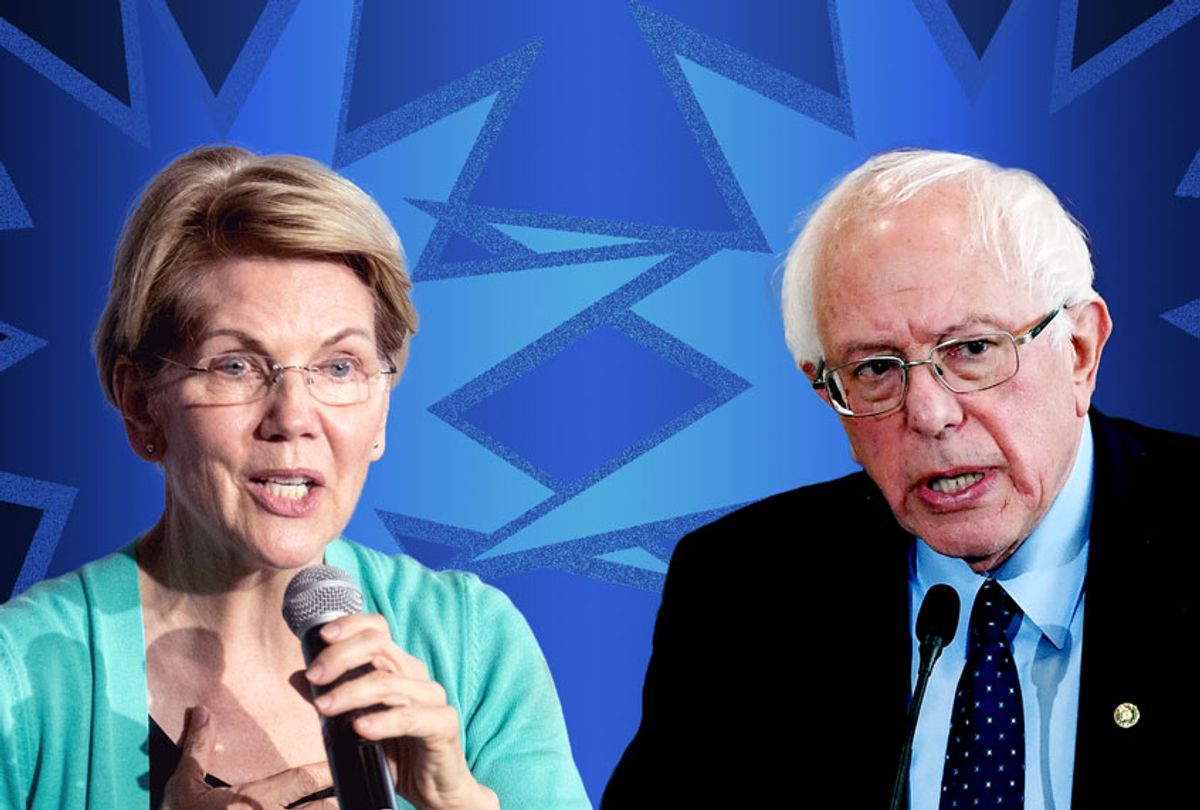Elizabeth Warren seems to be pulling away from Bernie Sanders as the likely progressive finalist against centrist Joe Biden. Her crowds have been large and enthusiastic. Warren's Madison Square Garden rally drew 20,000 supporters, and she stayed four hours after the event for fans lined up for the campaign’s trademark selfies with the candidate.
Warren recently placed first in the important Des Moines Register poll of likely Iowa primary voters, with 22 percent ranking her as their first choice to Biden’s 20, with Sanders lagging behind at 11. A Peter Hart poll for the Wall Street Journal and NBC News last week showed Warren closing the gap against Biden nationally, with the support of 25 percent of Democratic primary voters to Biden’s 31 percent, compared to just 14 percent for Sanders.
Other polls show Sanders still in first or second place in some states, including Nevada and the all-important California primary in March, but Warren seems to have that crucial quality called momentum. Her ground game in the early primary and caucus states is considered superb. Sanders last week had to shake up his New Hampshire operation.
Until now, Warren and Sanders have had a tacit nonaggression pact, in which neither attacks the other. Though some have urged Warren to embrace a more gradual path to universal health insurance coverage, her strategy is evidently to do nothing that would rile Sanders or his supporters. So Warren continues to back Sanders’ version of Medicare for All.
But obviously, they can’t both be the Democratic nominee. The rivalry, sooner or later, has to break into the open. There have already been a number of articles in the left press contending that Sanders, an avowed socialist, is the real deal while Warren is a latecomer to progressivism.
In the past two weeks, some of the sniping became semi-public, as Warren pulled a surprise coup by gaining the endorsement of the Working Families Party, which backed Sanders against Hillary Clinton in 2016. Its members are exactly the kind of savvy grassroots activists courted by both progressive candidates.
The WFP operates in 14 states, but has its greatest influence in the Northeast. The endorsement process, which resulted in Warren gaining the support of 61 percent of members and leaders, to Sanders’ 37 percent, was based on a formula whose details the party has thus far refused to disclose. Some in the Sanders camp have charged that the endorsement was rigged by party leaders who over-weighted their own votes.
Warren went out of her way to court the WFP, endorsing WFP-backed local candidates in Philadelphia and West Virginia, as well as two primary challengers to centrist Democratic House incumbents — in both cases, challengers backed by Rep. Alexandria Ocasio-Cortez, who is close to the WFP. It may be that Warren made a deal with the party leadership, or it may be that the endorsement progress was basically fair; either way, Sanders was outplayed.
If Warren continues to gain at Sanders’ expense, the most likely one to end the nonaggression pact is Sanders, while it is surely in Warren’s interest to keep the pact going as long as possible as she keeps pulling ahead.
Whether Sanders or Warren emerges as the strongest progressive challenger to Biden, each will ultimately need the goodwill and support of the other (and the other’s backers), to defeat both Biden and Donald Trump. Ideally, the truce would hold through the early caucuses and primaries, in Iowa and New Hampshire in February, and then the heavily Southern (and African American) primaries of Super Tuesday in March.
At that point, actual polls, as opposed to early opinion polls, will make clear which progressive candidate is more compelling. But if the bad feelings from the Working Families Party endorsement are any indicator, the truce may not last until then.
It would be a shame if the inevitable rivalry between Warren and Sanders turned into open animosity. For half a century, progressives have been waiting for a credible Democratic candidate who could rally the broad public to overturn a brand of Democratic leadership that has been far too cozy with the corporate and financial elite. That elite capture of so much of the economy’s wealth and income helped bring us Trump as improbable avenger.
But now we have an embarrassment of riches — not one but two such popular Democratic progressives. And if things break wrong, they could wreck each other.
The Democratic Party is not exactly famous for weaker candidates gracefully withdrawing in favor of stronger ones for the good of the party and the country. The greater likelihood is a fight to the finish. One can only hope that it is gentler than the usual Democratic demolition derby.

Shares